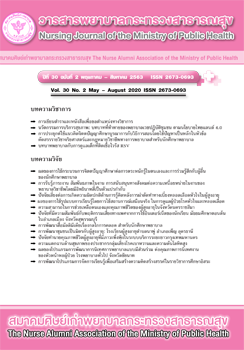The Development of Aged Friendly Community: Tambon Naphu Aging School in Amphur Phen, Udonthani
Main Article Content
Abstract
This Research for Community aimed to transfer knowledge from research knowledge management for utilization in aging school and to assess the effectiveness of knowledge transfer in aging school on communities and targeted populations. Participatory action research was applied for planning, action, observation and reflection. Research was conducted in Naphu sub-District, Phen District, Udonthani Province. Participants were local administrators, community leaders, local trainers, aging school students, and older persons’ caregivers. Data were collected using interviews, focus group and answering questionnaires. Frequencies, percentages, means, and standard deviations were used to analyze quantitative data. Content analysis was used to analyze qualitative data. The research findings revealed that knowledge and manuals obtained from research were beneficial for utilization in other settings. These included a manual for training of trainers of aging school, a lifelong learning curriculum to promote active aging, and a manual for older persons’ health promotion according to naturalism principles. The majority of aging school students had quality of life with a good level. This specific aging school was developed to be a master aging school for creating aging school network. Consequently, this led to several benefits in the community including social self-reliance, financial self-reliance which helped support community in fostering older persons’ good health, social participation, and life security leading to enhanced quality of life.
Article Details
บทความและรายงานวิจัยในวารสารพยาบาลกระทรวงสาธารณสุข เป็นความคิดเห็นของ ผู้เขียน มิใช่ของคณะผู้จัดทำ และมิใช่ความรับผิดชอบของสมาคมศิษย์เก่าพยาบาลกระทรวงสาธารณสุข ซึ่งสามารถนำไปอ้างอิงได้
References
2. World Health Organization. Global age-friendly cities: a guide. Geneva: World Health Organization. 2007
3. Department of Older persons, Ministry of Social Development and Social Security. Measures to implement
national agenda on aged society. Bangkok: Amarin Printing & Publising;2019. (in Thai)
4. Sapkaew Y. The development of elderly’s quality of life by using the elderly school curriculum, the excellent center in health promotion of elderly, Boromarajonani College of Nursing Nakhon Si Thammarat. Journal of Nursing and Education 2016;9(2):25-39. (in Thai)
5. Kemmis S, McTaggart R. The action research planner: doing critical participatory action research. Melbourne: Deakin University Press; 1990.
6. World Health Organization. Active ageing a policy framework [internet]. 2002 [cited 2018 May 6]. Available from:http://www.who.int/hpr/ageing/ageing discussion.pdf
7. Department of Health, Ministry of Public Health. Global age-friendly cities: a guide. Bangkok: Printing WVO; 2014. (in Thai)
8. Benjaphonpithak A, Wanitcharomni K, Phanuwatsuk P. The 5 dimensional happiness guide. for the older people. Nonthaburi: Office of Mental Health Development Department of Mental Health;2013. (in Thai)
9. The Department of Elderly Affairs. Handbook of the aging school. Bangkok: Division of Elderly Potential Promotion;2016. (in Thai)
10. Yodphet S. Phatanasri P. Sakdaporn T. Aging school: knowledge package for development as a potential older person. Bangkok: Foundation of Thai Gerontology Research and Development Institute;2017. (in Thai)
11. Nanthabutr K, et al. Building leaders’ skills regarding elderly health promotion. Khon Kaen: Research and Development of Community Health System. Faculty of Nursing Khon Kaen University;2012. (in Thai)
12. Kotetong P. Research and development of health behavior promoting programs for the elderly according to naturalist principle. (Doctoral’ s Dissertation) Faculty of Education, Mahasarakham Rajabhat University; 2016. (in Thai)
13. Division of Mental Health Promotion and Department of Mental Health. The expert manual: activities for enhancing the 5 dimensions of happiness of the older people in the community. Bangkok: Buddha press; 2017. (in Thai)
14. Office of the Permanent Secretary Ministry of Education. Lifelong education curriculum for the older people 144 Hours. Songkhla: Institute for Non-Formal Education and Informal Education, Southern Region; 2015. (in Thai)
15. Yodphet S, et al. Operation and activities of elderly clubs. Bangkok. J Print; 2012.
16. Department of Health Ministry of Public Health. Training course for family care volunteers of the older people and volunteers to take care of the aged for 18 hours [internet]. [cited 2017 March 16]. Available: http://hpc9.anamai.moph.go.th/images/pdf59/old59/old03.pdf (in Thai)
17. Mahatnirunkul S; Tuntipivatanaskul W; Pumpisanchai W., et al. Comparison of the WHOQOL-100 and the WHOQOL-BREF (26 items). Chiangmai: Suanprung Psychiatric Hospital; 1997. (in Thai)
18. Graneheim U H; Lundman B. Qualitative content analysis in nursing research: concepts, procedures and measures to achieve trustworthiness. Nurse education today, 2004;24(2):105-112.
19. Srisupan P; Thamikboworn S; Krisnachuta S. The eldery school and the capacity building of Isan local communities. Journal of Graduate Volunteer Centre, 2017;14(1):133-162. (in Thai)
20. Thamikboworn S. A model for sustainable community development for aging society: aging school and aging club. Ubonratchathani University Printing House. 2018. (in Thai)

